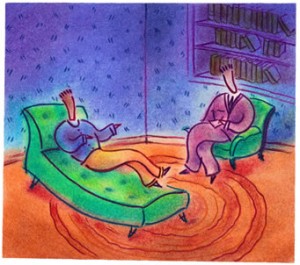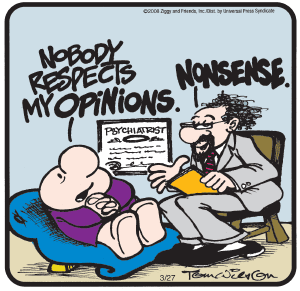People frequently ask me about psychotherapists. They think they might need one and want to know if I see one. If so, am I getting results?
Here’s my attempt at an answer.
Mood music:
https://youtu.be/34wASuHRuRo
I currently see a therapist. I like him and usually feel better after spending an hour spilling my guts in his office. He’s my sixth therapist in 10 years.
My first therapist helped me unlock a lot of buried emotions that were tearing me apart. The second therapist was a jackass who was clueless about the mind of an addict. (I didn’t stick with him long.)
The third one was only OK, and I left after a couple of years.
I saw my fourth therapist for five years, and he taught me a ton about how the brain works, how different disorders hamper the mind, and how different medications are designed to treat those problems. He also taught me a lot about mindfulness-based stress reduction — the practice of keeping one’s thoughts in the moment.
When he retired, I got a new therapist who was 45 minutes away. That didn’t last long.
Now I’m on therapist number six, who is right in town and flexible with his schedule.
I’ve gone months between therapists because I felt I didn’t need one anymore. But after a while I always remember that there’s no cure for my OCD and related mental health challenges. It’s all about learning to manage it all, and that’s where a good therapist can make a world of difference.
I can’t answer the question people usually put to me, which is whether I think they should see a therapist. That’s a personal decision and I’m not a doctor. I also can’t tell people what they should look for in a therapist. It helps if the therapist has experience dealing with your particular problem. In my case, that means someone who knows about OCD and addiction. It also helps if you like your therapist
I can tell you what I look for, though. Specifically, I need a therapist who:
- Doesn’t lecture me and tell me how I should do things. To me, that’s not what a therapist should do. That’s more the domain of a drill instructor.
- Asks a lot of questions. Therapists who ask a lot of questions force the patient to scour their feelings and get closer to the truth.
- Is willing to express their own feelings. This is a slippery slope, because a therapist is supposed to focus squarely on the patient. But when therapists respond to my experiences by sharing their similar experiences, they are showing me that they get it. The current therapist does that, and it’s refreshing. It makes me more willing to be honest. A therapist who shows no empathy makes me less willing to deliver my unvarnished truth.
If you are asking yourself if you need to talk to a professional, chances are you’ve exhausted a lot of other options. You have nothing to lose if you give it a try.







